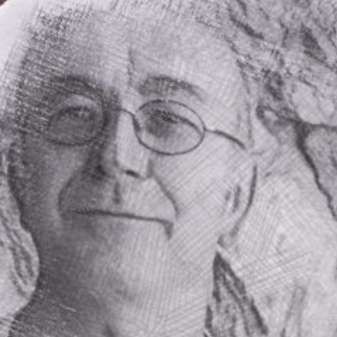The Jam House is a jazz and blues club occupying the BBC’s former Queen Street Studios in Edinburgh. Now owned by Jools Holland and designer Neil Tabbitt, its spacious Georgian interior is occasionally given over to theatrical and musical events. Peter Maxwell Davies’ Eight Songs for a Mad King (1969) qualifies as both music and theatre, and this production, which was directed by Ben Twist, designed by Fiona Watt and lit by Martin Palmer, was certainly theatrical.
Much of this was down to the astoundingly virtuosic and heartfelt performance of baritone Marcus Farnsworth who, I was astonished to discover, completed his studies only last year. The tortured mental state of George III is reproduced musically by many unbelievably large vocal leaps and angular intervals. The emotional content was expressed with great insight and considerable dramatic talent by this young man, despite the fact that porphyritic period portrayed occurred relatively late in the monarch’s life.
Much of the drama is delivered via monologue which unfolds as King George attempts to train his pet finches to sing. This informs some of the music, particularly the avian flute writing, expressively delivered by Rosemary Eliot. However, there are also deafeningly dense passages which convey the King’s internal racket. Percussionist Oliver Cox, whose role was described by Maxwell Davies in the programme as representing “the King’s keeper”, fuelled much of this. Indeed, he guided the frayed, nightshirt-clad George off-stage, thumping a bass drum while Farnsworth repeated the saddest of closing lines: “He will die howling”. There is much in Randolph Stow’s libretto which caught my ear and I intend to revisit the text.
Maxwell Davies makes use of many quotations, several of which are tangentially delivered, such as the saloon bar-style rendition of “Comfort Ye” from Handel’s contemporary work Messiah. There are several courtly dances whose skewed rendition contributes to the malaise of the piece. Another passage, which wouldn’t sound out of place in the musical Chicago, had me wondering if Maxwell Davies employed anachronism to convey the dislocation of time and place common to some mental afflictions. The nature of such music doesn’t readily highlight instrumental virtuosity. What was clear, though, was the Hebrides Ensemble’s ability to turn on a sixpence, and this helped to nail the volatile mood swings essential to this piece.
I attended a performance of Eight Songs for a Mad King thirty years ago and have never seen it advertised since. Could it be that, in addition to the work’s taxing nature, there is the problem of programming this 30-minute item? Inventive and considered programming has been a strength of every Hebrides event I have attended and this was one of their best. Although very varied, the pieces, each in their own way, pointed to the Maxwell Davies work which ended the evening’s seamless programme. Some connections were relatively straightforward, such as George Benjamin’s 1979 piece Flight for solo flute. Rosemary Eliot’s birdsong talents were called upon in this piece which, perhaps unsurprisingly, brought Messiaen to mind.
Thomas Adès’ Catch, which immediately preceded the Maxwell Davies, tilted us in the direction of both theatre and alienation. The clarinet, played with great sprightliness by Yann Ghiro, is exiled from the ensemble and, occasionally, the stage. Now circling the ensemble, now wandering centre-stage, he cut a lonely figure. At one point, wearing a head-torch to illuminate the “lyre” holding his music, he also became a mobile light source for us. Amongst the most tender sounds in this unusual work occurred when the scoring was pared down to violin and cello only. Imaginative use of double-stopping produced some haunting harmonies.
The inclusion of A Purcell Garland seemed puzzling until it dawned on me that quotation and anachronism bound it nicely to the main meat of the evening. Commissioned in 1995 by the Aldeburgh Festival, the source material comprises two Fantazias by Purcell whose tercentenary was at hand. The previously incomplete no. 13 in A minor was “finished” by Colin Matthews, while the Fantazia in F, “Upon One Note” was reworked by Oliver Knussen. Such is the adventurous nature of Purcell’s harmony that revisiting it 300 years later doesn’t produce the incongruity one might imagine. These works were very sensitively played and the counterpoint was clear and balanced. The beauty of Yann Ghiro’s clarinet sound and the musicality of his playing could have convinced anyone it was Purcell’s favourite instrument.
With a fine sense of symmetry, the programme opened with the percussive “King’s keeper” in Xenakis’ driving solo percussion work Rebonds (1987-89). Ranging from temple blocks to bass drum, the pitch span seemed as wide as that of the Maxwell Davies. Paired sticks in each hand, Oliver Cox seemed to highlight the relentlessness and volatility we would revisit across an evening which was as excellently performed as it was conceived.


